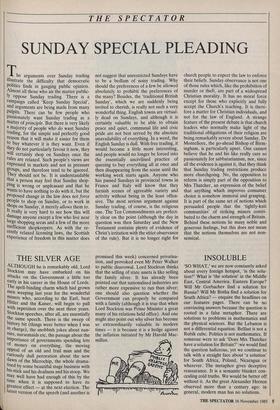THE SPECTATOR
SUNDAY SPECIAL PLEADING
The arguments over Sunday trading illustrate the difficulty that democratic politics finds in gauging public opinion. Almost all those who air the matter public- 1Y Oppose Sunday trading. There is a campaign called 'Keep Sunday Special', and arguments are being made from many Pulpits. There can be few people who passionately want Sunday trading as a matter of principle. But there is very likely a majority of people who do want Sunday. trading, for the simple and perfectly good reason that it will make it easier for them to buy whatever it is they want. Even if they do not particularly favour it now, they will certainly shop on Sundays once the rules are relaxed. Such people's views are expressed in markets and not in pressure groups, and therefore tend to be ignored. They should not be. It is understandable that a person may feel that Sunday shop- Ping is wrong or unpleasant and that he wants to have nothing to do with it, but the proposed change in the law does not force people to shop on Sunday, or to work in shops on Sunday, it merely allows them to. It really is very hard to see how this will damage anyone except a few who live near large shopping areas and a few of the more inefficient shopkeepers. As with the re- cently relaxed licensing laws, the Scottish experience of freedom in this matter does not suggest that unrestricted Sundays have to be a bedlam of noisy trading. Why should the preferences of a few be allowed absolutely to prohibit the preferences of the many? Besides, the 'traditional British Sunday', which we are suddenly being invited to cherish, is really not such a very wonderful thing. English towns are virtual- ly dead on Sundays, and although it is certainly valuable to be able to obtain peace and quiet, communal life and civic pride are not best served by the absolute unavailability of everything. In a word, the English Sunday is dull. With free trading, it would become a little more interesting, and people would no longer be forced into the essentially uncivilised practice of queuing to buy everything all at once and then disappearing from the scene until the working week starts again. Anyone who has passed Sundays in provincial towns in France and Italy will know that they furnish scenes of agreeable variety and activity without being in the least offen- sive. The most serious argument against Sunday trading, of course, is the religious one. The Ten Commandments are perfect- ly clear on the point (although the day in question was then Saturday and the New Testament contains plenty of evidence of Christ's irritation with the strict observance of the rule). But it is no longer right for church people to expect the law to enforce their beliefs. Sunday observance is not one of those rules which, like the prohibition of murder or theft, are part of a widespread Christian morality. It has no moral force except for those who explicitly and fully accept the Church's teaching. It is there- fore a matter for Christian individuals, and not for the law of England. A strange feature of the present debate is that church leaders who normally make light of the traditional obligations of their religion are being remarkably severe about Sunday. Dr Montefiore, the go-ahead Bishop of Birm- ingham, is particularly upset. One cannot believe that he and his like really care so passionately for sabbatarianism, nor, since all the evidence is against it, that they think that Sunday trading restrictions produce more churchgoing. No, the opposition to reform is simply part of the opposition to Mrs Thatcher, an expression of the belief that anything which improves consumer choice is somehow immoral and grasping. It is part of the same set of notions which persuaded people that the 'lightly-knit communities' of striking miners contri- buted to the charm and strength of Britain. Behind these notions lie many noble and generous feelings, but this does not mean that the notions themselves are not non- sensical.


































































 Previous page
Previous page